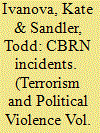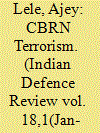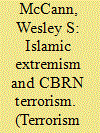|
|
|
Sort Order |
|
|
|
Items / Page
|
|
|
|
|
|
|
| Srl | Item |
| 1 |
ID:
072986


|
|
|
|
|
| Publication |
2006.
|
| Summary/Abstract |
This article investigates the relationship between regime characteristics and the likelihood of chemical, biological, radiological, and nuclear (CBRN) terrorist incidents. Odds ratios establish that democratic ideals-democratic rule, strong rule of law, and honest regimes-are associated with more CBRN incidents. Failed states may be where some terrorist groups form or take refuge, but these states have not been the venue of choice for CBRN incidents. Religious (cults and fundamentalists) and nationalist/separatist groups are not more likely than others to engage in CBRN attacks. To date, indiscriminate CBRN attacks are as likely as discriminate attacks to cause casualties. Transnational terrorist groups are less adept than others in concealing their acquisition of CBRN substances. For some regressions, democratic rule and strong rule of law are positive determinants of CBRN incidents.
|
|
|
|
|
|
|
|
|
|
|
|
|
|
|
|
| 2 |
ID:
055081


|
|
|
| 3 |
ID:
191003


|
|
|
|
|
| Summary/Abstract |
The extant literature on the relationship between religious ideology and CBRN weapons pursuit lacks a strong empirical basis. To address this, the current study utilizes a new dataset—the CBRN Terrorism Database (CTD)—to evaluate whether Islamic actors are more or less likely to pursue CBRN weapons. Binary logistic regression models are used on several different constrained subsamples to assess the relationship between ideology, group-, and country-level factors and CBRN weapons pursuit. Across the models, the strongest predictors of pursuit are whether the actor is an individual, is inspired by an Islamic ideology, and resides in a country with low levels of ethnic fractionalization. Other factors are important under specific contexts, but Islamic groups are significantly more likely to pursue CBRN weapons as well. Implications and recommendations are discussed.
|
|
|
|
|
|
|
|
|
|
|
|
|
|
|
|
|
|
|
|
|